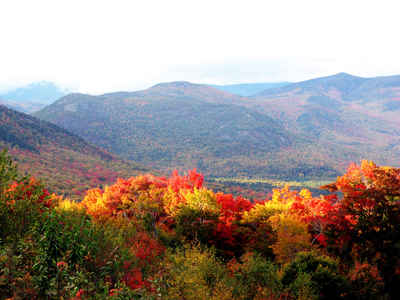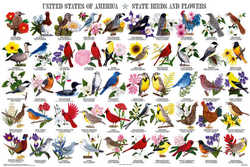New Hampshire State Bird
Purple Finch

(Carpodacus purpureus)
Adopted on April 25, 1957.
The purple finch, (Carpodacus purpureus,) was designated as the official state bird of New Hampshire. The pert little purple
finch toppled the one-time sturdy New Hampshire hen to become the Granite State's official bird, by vote of the 1957 Legislature.
Rep. Robert S. Monahan of Hanover, then Dartmouth College forester, sponsored a purple finch bill, which was filed in the House of Representatives
on February 12, Lincoln's birthday anniversary, with impressive backing. He later testified that it bore the support of the Audubon Society of New
Hampshire, the New Hampshire Federation of Garden Clubs, and the State Federation of Women's Clubs.
The purple finch proposal ran into quick opposition. Rep. Doris M. Spollett of Hampstead, veteran legislator and mail carrier and breeder of prize
goats, once again sponsored the New Hampshire hen for a state bird. She had lost an initial bid for this special breed of hen, to become the official
bird, eight years earlier, while serving in the Senate.
Monahan won speedy approval for the purple finch, as his bill came up for public hearing before the House Committee on Recreation, Resources and Development
on March 27, as he urged quick enactment "before some other state beats us to it."
The purple finch readily mustered broad legislative support, because of the respected influence of its sponsoring organizations, and Miss Spollett's
hen bill became pigeon-hold. The House Committee on Recreation, Resources and Development held a March 27 public hearing on Monahan's bill, and promptly
recommended its passage. The House then passed the purple finch, and the Senate speedily concurred. Governor Lane Dwinell of Lebanon signed the purple
finch into law on April 25.
New Hampshire Revised Statutes Annotated (RSA) 3:10
Anderson, Leon. History. Manual for the General Court 1981.
New Hampshire State Bird: Purple Finch

The male Purple Finch is similar to the House Finch but lacks brown streaks on the breast and belly, has a more purple head, shorter forked tail and different call notes.
Female House Finch lacks the distinctive face pattern of the female Purple Finch. Cassin's Finch is very similar in all plumages but has streaked undertail coverts and a larger bill. Male Cassin's has a brighter red crown. Female Cassin's has finer streaking on the breast and a less noticeable face pattern. Pine Siskin is similar to female but smaller and lacks face pattern. Sparrows are slimmer with longer tails and different markings.
Characteristics of the Purple Finch
Larger and stockier than House Finch, but smaller than Cassin's and darker than both. Dusky rose-red of male, more raspberry than purple, extends from upperparts to breast and flanks, brightest at crown and rump. Off-white below, mantle streaked with brown, wings and notched tail brown. Female has pronounced light stripe behind eye, dark stripe on jaw, and more heavily streaked breast than female House or Cassin's Finches.
Identification of the Purple Finch
- Length: 5.5 inches
- Large, conical bill
- Short, forked tail
- Distinctive call note often given in flight
Male
- Purplish-red head, breast, back and rump
- Streaked back
- White undertail coverts
- Brown wings and tail
- Immature male resembles female
Female
- Brown crown and cheek patch contrasting with pale supercilium and malar streak
- Heavily streaked underparts
- Brown upperparts
New Hampshire Revised Statute
The law designating the purple finch as the official New Hampshire state bird is Section 3:10 (State Bird) of the New Hampshire Revised Statutes, Title 1 (The State and Its Government) Chapter 3 (State Emblems, Flag, Etc) Section 3:10.
Title I: The State and Its Government.
Chapter 3: State Emblems, Flag, Etc.
SECTION 3:10.
3:10 State Bird. - The purple finch is hereby designated as the official state bird of New Hampshire.
Source. 1957, 87:1, eff. April 25, 1957.
Taxonomic Hierarchy: Purple Finch
Kingdom: Animalia - animals
Phylum: Chordata - chordates
Subphylum : Vertebrata - vertebrates
Class: Aves - birds
Order: Passeriformes - perching birds
Family: Fringillidae - Leach, 1820 - gros-becs, moineaux, roselins, Old World Finches, Finches, Hawaiian Honeycreepers
Subfamily: Carduelinae
Genus: Haemorhous - Purple Finches
Species: Haemorhous purpureus - Purple finch
This species and the other "American rosefinches" are placed in the genus Haemorhous by the American Ornithologists' Union but have usually been
included in Carpodacus. It is included in the finch family, Fringillidae, which is made up of passerine birds found in the northern hemisphere and
Africa. The purple finch was originally described by Johann Friedrich Gmelin in 1789








